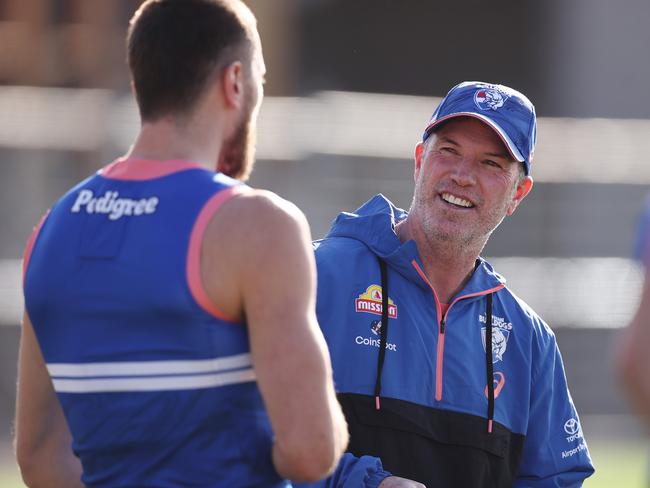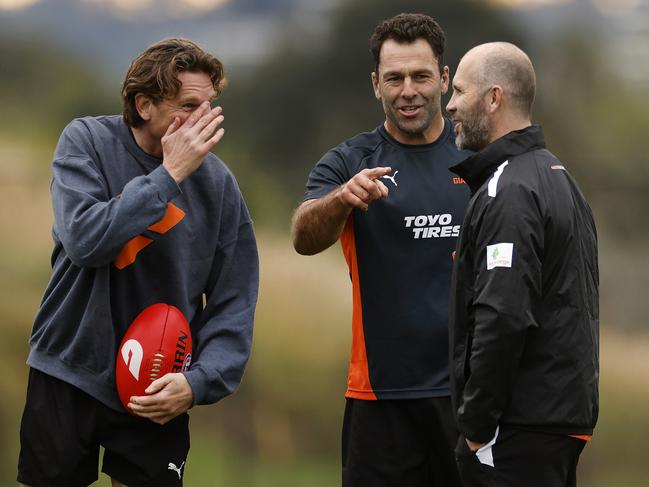Fears are growing that the next wave of AFL senior coaches are not being adequately prepared
On average, AFL executive salaries are 54 per cent higher than they were pre-Covid – but assistant coaches across the league have taken a pay cut. And the effects are being felt.
AFL News
Don't miss out on the headlines from AFL News. Followed categories will be added to My News.
Fears are growing that the next wave of AFL senior coaches are not being adequately prepared due to neglected assistants being underpaid, overworked and deprived of sufficient professional development.
AFL Coaches’ Association members are only granted $1500 annually for professional development while most assistants are denied pay rises regardless of their longevity.
This masthead asked more than a dozen superstars to name their best assistant and more than 20 unheralded coaches who they said they spoke on a daily basis were praised.
Some of those respected mentors have been lost to the elite level.

“If we’re wanting to prepare the next group of senior coaches then seeing the best in class, whether it’s overseas or doing courses here, requires some investment,” AFLCA chief executive Alistair Nicholson told this masthead.
“For all our assistant coaches we provide the same level of funding, that’s $1,500 annually, and they may then also have some arrangement with their club.
“Some clubs absolutely invest, so I’m not saying it’s not happening at all.
“But consistently across the board is the way we operate, and so if there is funds that can go into professional development it’s almost like an investment into our next level of senior coaches.
“Our view is when you’ve been in the system for six, seven, eight years we think that level should increase, from our funding ideally, but also from clubland as well.
“So they’re not feeling like they’re inhibited about what gaps they need to fill before they potentially go to a senior role or move to a football manager role or something else.”
Football has become a two-speed economy — the AFL executive and players banked record average salaries in 2023, while assistant coaches have still not had their remuneration restored to pre-Covid levels.
That is due to the slashed soft cap on football department spending. The cap peaked at $9.6 million in 2019 but is currently $7.25 million.
Clubs employ 42-46 players, but streamlined football departments containing fewer coaches are expected to service unchanged list sizes.
The men’s competition employs about 170 coaches. The rough breakdown is 18 senior coaches, 70 assistant coaches and the rest are comprised of heads of development, development coaches and AFL-aligned state-league coaches.
The average assistant makes $172,000 and has limited capacity to grow their income without landing one of the 18 senior positions.

“An assistant coach in their first three or four years is on a reasonably similar pay level to someone who might’ve been an assistant coach for 10 years,” Nicholson said.
“So experience over time is not necessarily scaled up. We do find that assistant coaches bring a lot of value into the football programs, which is undervalued and unrecognised.”
Assistants at premiership teams are also rarely rewarded with bonuses due to the tightness of the soft cap.
Termination clauses remain another critical issue. Assistants employed at clubs reliant on AFL funding have guidelines that can only guarantee six-month payouts.
Powerhouse clubs less reliant on league handouts have greater discretion to look after their sacked coaches by paying out their contracts in full.
Payouts for sacked assistants used to be as little as 1-3 months.

“The termination clauses are what the coaches talk about a lot. Having a full contract payout, or at least a 12 or six-month buffer zone, combats some of that volatility,” Nicholson said.
“Sometimes the senior coach might be moved on and the assistant coaches are left vulnerable, and that’s where some security around termination clause length would go a long way to helping balance your mental health and where your family is at.”
The AFLCA wants to emulate some of the AFL Players’ Association themes for coaches exiting the game.
“I think we can do a lot better,” Nicholson said.
“Whether it’s a transition fund or more regular services and well-being support.
“There’s definitely more conversation around the coaching profession then two years ago, but I’m keen for some of these things to progress in the next 12-24 months so that the profession continues to be attractive.”




